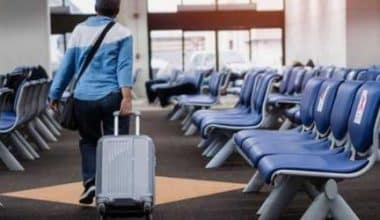Travel management tools can help you gain a better understanding of your customer’s needs, which can be used to create and visualize promotional strategies tailored to their needs. You can compare a travel management system to the central processing unit (CPU) of your computer. Because it’s such an important system, you’ll want to make sure you’re using the right platform for your company’s travel. In this article, you will learn about the best free tools you can use when looking for travel management software.
What Is a Travel Management System?
A travel management system (TMS) is a comprehensive software platform that facilitates the management of all aspects of the travel industry, from service providers to bookings, pricing tracking, inventory analysis, and beyond.
This free travel management software may include all types of travel, such as hotels, cars, buses, trains, and aircraft, as well as individual or group tour packages. Companies use these tools to streamline purchasing decisions, centralize employee travel expense records, and manage corporate travel management budgets. The travel management system allows users to book and report travel purchases without using agents or submitting self-purchased receipts.
Furthermore, this software improves visibility between managers and employees when it comes to corporate travel and allows accountants and managers to run reports and reimburse employees. It also ensures that employee work-related travel is in accordance with company policy. Although products in this category frequently integrate with or include expense management and mileage tracking features, the free travel management software focuses solely on reporting travel expenses.
What Is the Role of Travel Management Services?
In addition to flight and hotel reservations, the TMC will offer aircraft charter, airport lounges, parking and transfers, hotel bed requests, car hire, chauffeurs, foreign exchange, group travel, hotel bill backs, insurance, leisure travel, marine travel, meal requests, meet and greets, passport and visa procurement, rail tickets, roadshow services, and venue sourcing. Every booking is made in accordance with the company’s travel policy, which is based on a database of travelers’ and employees’ profiles.
Other management services that are frequently provided include MIS reporting, account management, risk management, cost/expense management, traveler tracking/security, and adherence to travel policies. Many TMCs now offer online self-booking tools, allowing organizations to make their own flight and hotel reservations and bookings. In addition, TMCs frequently work out preferential pricing and membership rewards programs with suppliers and vendors.
What Are the Features of the Free Travel Management Software?
The free travel management software has the following features:
- Hotel and airline reservations
- Making master itineraries
- Individual schedule management
- Coordination of team members’ schedules
- Reporting and tracking of travel expenses
- Payment and reporting of taxes
- Calendar sync for travel plans
- Storage of travel documents
- Assistance with flight cancellations
- Updates to the destination’s condition
- Traveler security and safety
- Management of travel policies
- Application for mobile devices.
- Reminders and alerts for travelers
- Updates to the weather forecast
The Benefits of Using a Travel Management System
- You can automatically assign leads to team members.
- With the help of a third-party telephony integration, you can connect your CRM system with your existing phone system.
- You have the ability to tag incoming leads as “Hot,” “Warm,” or “Cold.” This will assist you in concentrating on converting the hottest leads first.
- If you have billboards, you can connect them to your email to collect calls and emails.
- When a lead is generated, a customer account is automatically created, and if the lead is an existing one, the old account is updated.
- You can also track social media mentions of your company with easy API integration.
- From one convenient location, you can track the number of leads generated by each source. You can also identify the most fruitful methods of acquisition used for the lead. The phone calls and emails that come from your billboards can be sent straight to your inbox.
- Travel management tools let you sort leads from website forms, pop-ups, social media, and live chats without using multiple spreadsheets. Watch as your leads arrive in your central inbox.
Why Is a Travel Management System Important?
A good travel management system centralizes travel data and decision-making and integrates with other business components, improving operations.
How Do Travel Management Companies Work?
It typically entails defining a travel policy, communicating with vendors, making reservations, and assisting with the monitoring and management of travel costs and expenses. They are responsible for handling a client’s travel arrangements.
What Are the Travel Management Pillars?
Due to the many moving parts and considerations that make a trip safe, travel management tools can be complex. These four pillars are essential to making a business trip rewarding and successful, despite the difficulties that may arise.
#1. Employees’ Safety
Employee safety during corporate travel is a top priority for most businesses, regardless of the industry. Growth in business travel volumes and changes due to climatic changes, natural disasters, terrorist activities, accidents, and political unrest have created a need for companies to have a comprehensive and structured business travel safety program.
Business travel admins can fill policy gaps and prepare their companies for future safety challenges as safe travel grows. Pre-emptive initiatives to assist employees, such as safety briefings, training, and pre-trip documents, can instill a sense of security in employees. This, in turn, may lead to increased employee productivity and loyalty, boosting the business.
#2. Cost Efficiency
The cost of business travel is the second highest operational cost for most organizations. Business travel is critical to both maintaining and expanding a business, and with rising travel costs, it is becoming increasingly important for corporations to drive higher levels of efficiency in their managed travel programs.
An organization’s travel costs include much more than just the cost of airline tickets. Organizations must consider all travel procurement, management, and use costs to determine the total financial impact. These are some examples:
- Front-end Costs: These include the money a company spends on “Duty of Care,” “travel management,” “procurement,” “supplier,” and “contract” administration.
- Travel Expenses and Costs: The cost of travel includes the purchase of tickets, parking fees, vehicle lease or hire costs, as well as maintenance and fuel costs. Accommodation fees, travel expenses, and insurance claims may all incur additional costs.
- Back-end Costs: Invoicing and expense processing costs, management, and reporting costs, and possibly litigation costs are other significant expenses when traveling internationally, especially given the volatility of exchange rates.
#3. Productivity
In today’s high-pressure work environment, 46% of the workforce suffers from stress due to tight deadlines, conflict among coworkers, long work hours, etc. Employees who are under a lot of stress perform poorly. This is reflected in lower job engagement, decreased productivity, and increased absenteeism. Traveling for business can expose employees to variables beyond their control, such as flight delays. This can increase the likelihood of stress.
It was discovered that 87% of business travelers believe that the quality of their business travel has an impact on their business results. Access to certain facilities and Wi-Fi connectivity is critical for a successful business trip for the modern business traveler. Long transit times, hostile work environments while traveling, inconvenient hotel locations, and meals, among other things, can all cause stress for a business traveler.
However, foreign exchange availability is a major concern for international travelers due to restrictions on carrying foreign currency. This is especially true for long-distance trips that include multiple destinations. Business travelers are sometimes required to carry multiple currencies for such trips, which can be stressful. Having a forex travel card can greatly alleviate these concerns.
These stress-inducing elements can reduce employee productivity by disrupting their peace of mind and distracting them from business objectives. Employees must feel relaxed and refreshed at all stages of travel in order to maximize the purpose of a business trip. This allows them to concentrate solely on their work, resulting in better performance. Over 90% of these business travelers agreed that business travel has an impact on their job satisfaction and performance. This is especially true among millennials, who believe that in order to be productive, business and pleasure must go hand in hand.
#4. Transparency
The business travel industry, like any other, has buyers and sellers, as well as a network of partners who help to bridge the gap between supply and demand. A travel buyer’s supply chain is complex, with airlines, hotels, transportation providers, technology companies, payment providers, GDS, TMCs, and others involved. These suppliers and partners have contracts not only with buyers but also with one another, adding to the supply chain’s complexity. Airlines and hotels have agreements with GDSs; GDSs have agreements with TMCs, and TMCs have agreements with airlines and hotels – all of which are separate from each party’s agreement with the buyer. There is a complex web of interdependencies among these participants.
As a result, a complex and imperceptible stream of payments, incentives, commissions, bonuses, overrides, discounts, waivers, and favors flow throughout the value chain. This presents a problem for travel managers. With the advent of online booking and the growing importance of personal data security, there is an increased need to ensure that no data leaks occur in terms of employees traveling for business. Although third-party agreements always include confidentiality and non-disclosure clauses, corporations must ensure their effectiveness.
Transparency regarding traveler satisfaction can assist corporations in not only retaining and attracting employees but also improving travel ROI. Transparency in the aforementioned areas can help travel managers improve the effectiveness of their company’s travel.
What Technology Do Travel Agents Use?
With so many technologies constantly bombarding the travel industry, it can be difficult to sort through the options and opportunities to find what will benefit even the most technologically savvy travel agents.
Mobile technology, social media, and the human touch are among the more critical technologies that a travel agent must use. Today’s tech-savvy agents must be mobile, able to connect with their clients, and access critical travel data from any device—notebooks, tablets, and smartphones – at any time and from any location.
Furthermore, social media is not going away, and one writer in the industry said that travel agents need to “get a personality.” Build a social media presence and integrate it into marketing and communication strategies. Social media is one of the most important travel management tools that major corporations are using to increase brand awareness and customer relationships.
Finally, there is the human touch. No technology on the planet can ever replace the value of the human touch. Computers and analytics can generate a plethora of trending data, but it is up to the travel manager or agent to use that data to personalize each client’s trip. Humans build relationships, not technology.
Conclusion
When it comes to business travel, a travel management system promotes visibility between managers and employees and allows accountants and managers to run reports and compensate employees. I hope this guide will be of help to you.
Travel Management System FAQs
What are the features of tourism management?
It means managing a plethora of activities such as researching tour destinations, planning the tour, making travel arrangements, and providing lodging. It also includes marketing efforts to entice tourists to visit specific destinations.
How can travel management be improved?
5 steps to the best travel management process flow
- Establish priorities for administrators, managers, and travelers.
- Use a booking platform that allows travelers to make their own reservations.
- Simplify your policies and approvals process.
- Assist travelers in obtaining direct assistance.
What is a travel software?
Travel Agency software is a type of software that helps companies manage a wide range of travel products, like flights, hotels, and activities. With this software, companies can offer packages, quotes, and itineraries, start marketing campaigns, process payments, and keep track of the organization’s financial health.
{
“@context”: “https://schema.org”,
“@type”: “FAQPage”,
“mainEntity”: [
{
“@type”: “Question”,
“name”: “What are the features of tourism management?
“,
“acceptedAnswer”: {
“@type”: “Answer”,
“text”: “
It means managing a plethora of activities such as researching tour destinations, planning the tour, making travel arrangements, and providing lodging. It also includes marketing efforts to entice tourists to visit specific destinations.
“
}
}
, {
“@type”: “Question”,
“name”: “How can travel management be improved?
“,
“acceptedAnswer”: {
“@type”: “Answer”,
“text”: “
5 steps to the best travel management process flow
- Establish priorities for administrators, managers, and travelers.
- Use a booking platform that allows travelers to make their own reservations.
- Simplify your policies and approvals process.
- Assist travelers in obtaining direct assistance.
“
}
}
, {
“@type”: “Question”,
“name”: “What is a travel software?
“,
“acceptedAnswer”: {
“@type”: “Answer”,
“text”: “
Travel Agency software is a type of software that helps companies manage a wide range of travel products, like flights, hotels, and activities. With this software, companies can offer packages, quotes, and itineraries, start marketing campaigns, process payments, and keep track of the organization’s financial health.
“
}
}
]
}
Related Articles
- Business Liability Insurance: Definition, Costs, Coverage & Cost-Effective Options
- GENERAL LIABILITY INSURANCE FOR SMALL BUSINESS: Cost & Best Options
- THE BEST EXPENSE MANAGEMENT SYSTEMS
- EXPENSE MANAGEMENT TOOLS: Step by Step Guide and Best Tools to Use
- Expense Management: Definition & 13 Best Expense Management Software






